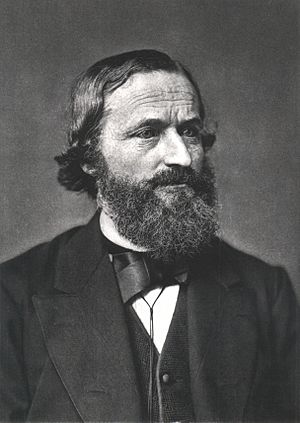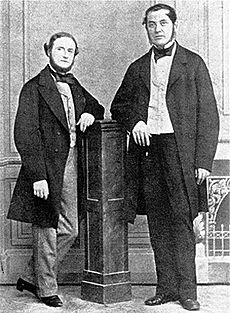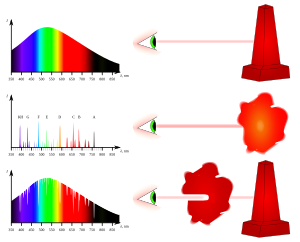Gustav Kirchhoff facts for kids
Quick facts for kids
Gustav Kirchhoff
|
|
|---|---|
 |
|
| Born |
Gustav Robert Kirchhoff
12 March 1824 |
| Died | 17 October 1887 (aged 63) |
| Nationality | Prussian (1824–1871) German (1871–1887) |
| Alma mater | University of Königsberg |
| Known for | Kirchhoff's circuit laws Kirchhoff's law of thermal radiation Kirchhoff's laws of spectroscopy Kirchhoff's law of thermochemistry |
| Awards | Rumford medal (1862) Davy Medal (1877) Matteucci Medal (1877) Janssen Medal (1887) |
| Scientific career | |
| Fields | Physics Chemistry |
| Institutions | University of Berlin University of Breslau University of Heidelberg |
| Doctoral advisor | Franz Ernst Neumann |
| Notable students | Loránd Eötvös Edward Nichols< Gabriel Lippmann Dmitri Ivanovich Mendeleev Max Planck Jules Piccard Max Noether Heike Kamerlingh Onnes Ernst Schröder |
Gustav Robert Kirchhoff (12 March 1824 – 17 October 1887) was an important German physicist. He helped us understand electrical circuits, how light works (called spectroscopy), and how hot objects give off radiation.
He created the term "black-body radiation" in 1862. Many important ideas are named "Kirchhoff's laws" after him. These laws cover topics like light from hot objects, electricity, and how heat changes in chemical reactions. The Bunsen–Kirchhoff Award for spectroscopy is named after him and his friend, Robert Bunsen.
Contents
Life and Discoveries
Gustav Kirchhoff was born on March 12, 1824, in Königsberg, Prussia. His father, Friedrich Kirchhoff, was a lawyer. Gustav studied at the Albertus University of Königsberg. He learned a lot about math and physics there.
In 1847, he moved to Berlin. Later, he became a professor at the University of Breslau. In 1857, he married Clara Richelot. They had five children together. After Clara passed away, he married Luise Brömmel in 1872.

Kirchhoff developed his famous circuit laws in 1845. He was still a student at the time! These laws are used everywhere in electrical engineering today.
In 1854, he became a professor at the University of Heidelberg. There, he worked with Robert Bunsen on studying light. In 1857, he figured out that an electric signal in a wire with no resistance travels at the speed of light.
He also proposed his law of thermal radiation in 1859. He proved it in 1861. Kirchhoff and Bunsen also invented the spectroscope. This tool helped them identify the elements in the Sun. They showed that the Sun contains sodium. In 1861, they even discovered two new elements: caesium and rubidium.
Kirchhoff taught a special math and physics class at Heidelberg. Famous students like Arthur Schuster and Sofia Kovalevskaya attended his classes.
He made huge contributions to spectroscopy. He created three laws that explain the colors of light given off by hot objects. In 1862, he won the Rumford Medal for his work on the Sun's light. In 1875, Kirchhoff became the first professor of theoretical physics in Berlin.
He also worked on optics, which is the study of light. He helped improve Huygens' principle, which describes how light waves spread.
Gustav Kirchhoff passed away in 1887. He was buried in Berlin.
Kirchhoff's Circuit Laws
Kirchhoff's circuit laws help us understand how electricity flows.
- His first law says that all the electric currents flowing into a point in a circuit must add up to zero. This means current doesn't disappear or appear.
- His second law says that if you go around a closed loop in an electrical circuit, all the voltage changes must add up to zero.
Kirchhoff's Three Laws of Spectroscopy
Kirchhoff's laws of spectroscopy explain how different types of light are made:
- A solid, liquid, or very dense gas that is hot enough to glow will give off light of all colors. This creates a smooth, "continuous spectrum."
- A thin, hot gas will only give off light at certain specific colors. This creates an "emission spectrum" with bright lines.
- If light from a continuous spectrum passes through a cool, thin gas, the gas will absorb some specific colors. This creates an "absorption spectrum" with dark lines.
Kirchhoff didn't know why these specific lines appeared. Later, scientists like Niels Bohr explained that these lines are caused by electrons moving between different energy levels in atoms.
Kirchhoff's Law of Thermal Radiation
Kirchhoff's work on Kirchhoff's law of thermal radiation was very important. It helped Max Planck discover the "quantum of action." This discovery led to the field of quantum mechanics, which studies the tiny world of atoms and particles.
Kirchhoff's Law of Thermochemistry
Kirchhoff also showed how the heat of a chemical reaction changes with temperature. This is important in thermochemistry. He explained that the change in heat for a reaction depends on how much the heat capacity of the products differs from the reactants. This helps scientists predict how much heat a reaction will produce or absorb at different temperatures.
See also
 In Spanish: Gustav Kirchhoff para niños
In Spanish: Gustav Kirchhoff para niños
- Kirchhoff's circuit laws
- Spectroscopy
- Black-body radiation
- List of German inventors and discoverers


